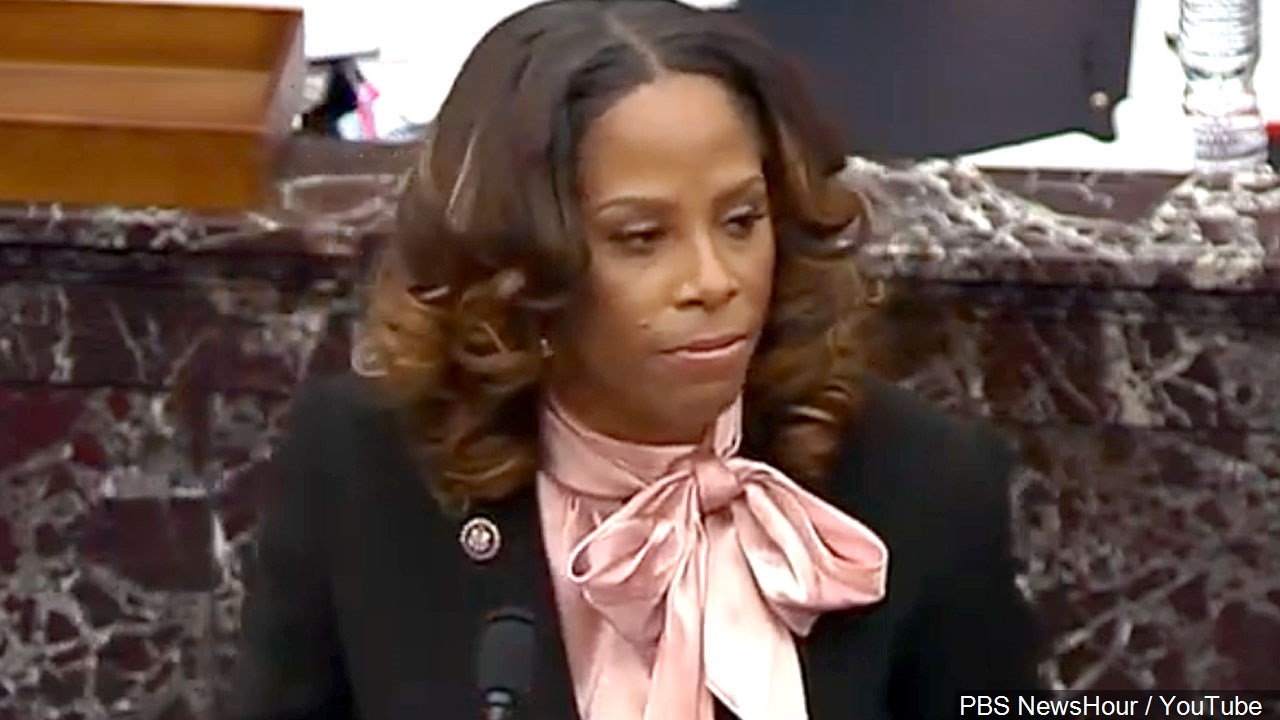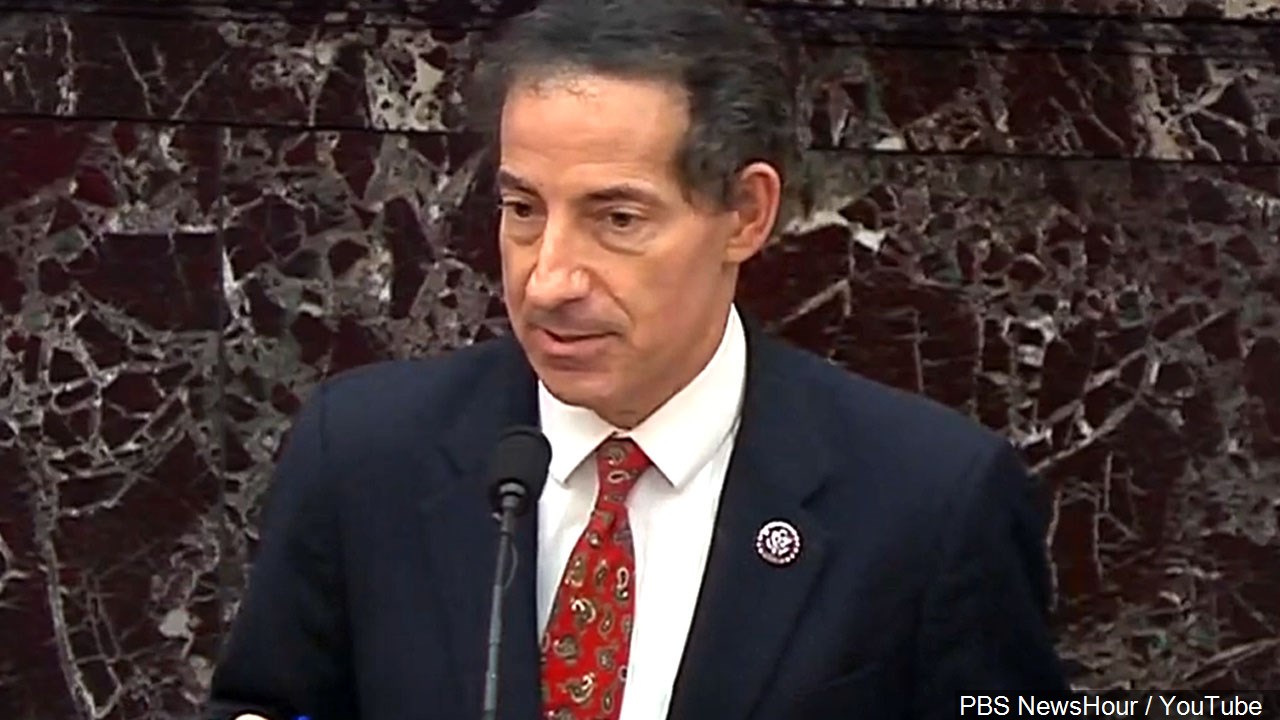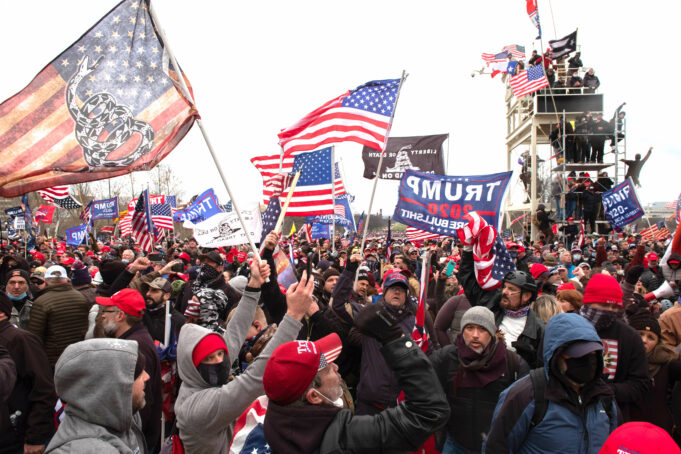WASHINGTON—For the unprecedented second time in just 13 months, the U.S. Senate voted to acquit Donald J. Trump in an impeachment trial. Although seven Republicans joined all 50 Senate Democrats—the largest bi-partisan impeachment vote ever—the vote was 10 short of the constitutionally required two thirds majority needed to convict the former president of inciting the Jan. 6 mob attack on the U.S. Capitol.
Minutes after the verdict was announced, Mr. Trump celebrated, sending out a statement declaring his vindication, and complaining of the “witch hunt” he claimed was being waged against him. He said that Democrats’ attempt to end his political career had failed, boasting, “Our historic, patriotic and beautiful movement to Make America Great Again has only just begun.”

Despite a withering prosecution by impeachment prosecutors from the House of Representatives, with graphic videos of rioters carrying Trump flags and Confederate flags breeching the security of Capitol Police, rampaging through the Senate chambers and pillaging the offices of congressional leaders and chanting death threats to Vice President Mike Pence and House Speaker Nancy Pelosi—second and third officially in the line of presidential succession—Republican loyalty, or fear of Mr. Trump’s grip on their party, kept enough senators in line for his Feb. 13 acquittal.
Rep. Madeleine Dean (D-Pa.), an impeachment manager, put it bluntly in her closing argument: “If we don’t set this right and call it what it was, the highest of constitutional crimes by the president of the United States, the past will not be past. The past will become our future. Senators, we are in a dialogue with history.”
Del. Stacey Plaskett (D-Virgin Islands), a House impeachment manager who starred in her role in exposing Trump high crimes, talked about the case with CNN’s Jake Tapper the day after the acquittal. She dealt with Tapper pleas and questions about why no witnesses were called on the last day of Senate hearings? More witnesses weren’t needed, more Republicans needed to have more spine and less fear of the Republican Party’s leader, she said.

“The impeachment power exists to say that no one, not even the president of United States, should be above the law, should be above accountability,” author John Nichols told this writer in an interview for WPFW-FM’s “Monday Morning QB” program. “And we should understand that, but clearly, as a country, we have not learned that.
“That doesn’t mean that you give up,” Mr. Nichols continued. “I don’t think any of us give up, but it does mean that, after so compelling a case for the conviction of Donald Trump … To my mind, as someone who’s written books about impeachment, I think it’s the most powerful case ever made, and the most effectively made case. That should mean something. And it is truly sad, truly disappointing that it (did) not.”
Impeachment managers meticulously made the case that Mr. Trump invited the mob to Washington on the day Congress was to certify Joe Biden’s Electoral College victory, then he incited them, aimed them at the Capitol where the certification was to take place, then “lit the fuse” igniting their rampage which resulted in the death of seven people.
Rep. Eric Swalwell (D-Calif.) laid out damning evidence that showed that the former president helped plan the Jan. 6 insurrection by telling his supporters that the election had been stolen from him. Literally changing the date of a rally originally planned for after Mr. Biden’s inauguration to the date of the Electoral College certification—Mr. Trump urged supporters again and again that they must act—must “fight”—to overturn the results.
The California Democrat introduced multiple Trump tweets as evidence and revealed the former president’s campaign purchased ads encouraging supporters to come to Washington, D.C., on the day that Congress was set to certify Mr. Biden’s election win.
“On Dec. 26 he tweets, ‘If a Democrat presidential candidate had an election rigged and stolen, with proof of such acts at a level never seen before, the Democrat senators would consider it an act of war and fight to the death,’ ” Mr. Swalwell told senators.
“ ‘Mitch and the Republicans do nothing, just want to let it pass, no fight,’ ” the tweet continued. “He is saying the Republicans are doing nothing and have no fight because you are doing your job taking on the constitutional process of certifying the Electoral College results. He also suggests, President Trump, that if this was the reverse and the Democrats had lost, it would be an act of war.
“An act of war,” Mr. Swalwell added. “That’s how Donald Trump prepared his supporters for Jan. 6. He even stated again 14 minutes later to make sure his supporters understood, quote, ‘The Justice Department and the FBI have done nothing about the 2020 presidential election voter fraud. The biggest scam,’ all caps, ‘in our nation’s history despite overwhelming evidence. They should be ashamed.’
Then, he adds, “ ‘History will remember. Never give up. See everyone in D.C. on Jan. 6.’ That phrase, history will remember, was the only time, the first time, Donald Trump had used it in his presidency. He sent this to 70-plus million Twitter followers the day they needed to show up and be ready to fight.”
The Trump defense never sought to prove his innocence, instead arguing that the trial itself was unconstitutional because Mr. Trump was a private citizen and could not be “removed from office” as the Constitution provides; because the First Amendment granted him free speech protection and presented dozens of instances of Democrats using the word “fight” in political speeches. Mr. Trump did not instigate the illegal behavior because dozens of lawbreakers intended to breech the Capitol without any encouragement from the former president, said defense lawyers.
Ironically, Mr. Trump’s “free speech” defense was reliant on a 1969 Supreme Court decision which permitted Clarence Brandenburg, a Ku Klux Klan member to legally spew a vile, profanity-ladened racist and anti-Semitic commentary which had violated an Ohio law.
Unlike in Mr. Trump’s defense in his first impeachment, this time, not once did his defense team argue that what the former president did was acceptable conduct.
In another irony, Mr. Trump’s father Frederick Trump was arrested in a 1927 New York, KKK Memorial Day weekend rally. According to an article published in The New York Times, and unearthed by the tech blog BoingBoing.net in 2015, “1,000 white-robed Klansmen marched through the Jamaica neighborhood, eventually spurring an all-out brawl in which seven men were arrested.” Fred Trump was one of the seven detained.
Democrats needed 17 Republicans to vote with them to convict Mr. Trump of inciting an insurrection. In the end, they got seven: Senators Richard M. Burr of North Carolina, Bill Cassidy of Louisiana, Susan Collins of Maine, Lisa Murkowski of Alaska, Mitt Romney of Utah, Ben Sasse of Nebraska and Patrick J. Toomey of Pennsylvania.
Still, seven Republicans did vote to convict him, making this the most bipartisan impeachment effort in American history. Until a year ago, when Mr. Romney cast the lone Republican “guilty” vote in Mr. Trump’s first impeachment trial, no senators had ever voted to convict a president from their own party.
Several Republicans who voted to acquit Mr. Trump still declared him responsible for the assault on the Capitol, including Sen. Mitch McConnell of Kentucky, the minority leader. “The people who stormed this building believed they were acting on the wishes and instructions of their president,” Mr. McConnell said after he voted to acquit, “and having that belief was a foreseeable consequence of the growing crescendo of false statements, conspiracy theories and reckless hyperbole, which the defeated president kept shouting into the largest megaphone on planet earth.”
Mr. McConnell’s stated reason for his “not guilty” vote was that Mr. Trump was no longer in office—even though it was Mr. McConnell, then Senate Majority leader—who prevented the Senate from beginning the trial while Mr. Trump was in office.
“A mob was assaulting a Capitol in his name,” Mr. McConnell said in his remarks immediately after the floor vote. “These criminals were carrying his banners, hanging his flags and screaming their loyalty to him. There’s no question, none, that President Trump is practically and morally responsible for provoking the events of the day.”
And yet another irony, three, Republican Senators: Lindsey Graham (S.C.), Ted Cruz (Texas) and Mike Lee (Utah), all met with the Trump defense team Feb. 11, the night before the defense team presented their case. Ostensibly, three of the “jurors” colluded with the defense, rendering them in effect, a “jury of his accomplices.”
“Yes, it does,” Mr. Nichols agreed. “And even before they met, they were accomplices. This is the important thing to understand. The idea that senators who are jurors in this trial would meet with the defense team and (offer) guidance for how to prevail in the trial, it’s appalling. And it ought to lead to ethics charges and ethical censure, perhaps even to expel these senators.”
Demographically, 57 senators who voted to convict Mr. Trump represent 76.7 million more people than 43 senators who voted to acquit, but they were still 10 short of the constitutionally required two-thirds majority vote needed to convict him.
Just before the Jan. 6 riot, Mr. Trump told his supporters: “If you don’t fight like hell, you’re not going to have a country anymore.” In an attempt to suggest the metaphorical nature of political speeches, Mr. Trump’s lawyers presented video of elected Democrats and some celebrities uttering the word “fight.”
“Republicans are constantly fighting like a boxer with his hands tied behind his back,” Mr. Trump said in the rally. “And we’re going to have to fight much harder.”
His lawyers leaned heavily on Mr. Trump’s single use of the word “peacefully” as he urged backers to march to the Capitol while minimizing the 20 times he used the word “fight.”
“No thinking person could seriously believe that the president’s Jan. 6 speech on the Ellipse was in any way an incitement to violence or insurrection,” defense attorney Michael van der Veen said during the trial. “The suggestion is patently absurd on its face. Nothing in the text could ever be construed as encouraging, condoning or inciting unlawful activity of any kind.”
Sen. Ron Johnson (R-Wis.), one of those who voted to acquit Mr. Trump agreed: “I think the president’s lawyers blew the House manager case out of the water. They legally eviscerated them.”
There was some complaining that after winning a procedural vote to allow them to call a witness that Mr. Trump knew that his own vice president was in mortal danger and then tweeted another condemnation of Mr. Pence, instead of prolonging the trial with more evidence they conceded.
Impeachment Manager Swalwell replied: “To 57 bipartisan senators and in the court of public opinion, we proved Donald Trump guilty of the greatest crime ever against our Constitution. And, we did it with overwhelming, un-contradicted evidence. We didn’t need more witnesses; we needed more spines.”
“The evidence is damning, chilling, and overwhelming. Only cowardice and complicity stands in the way of conviction,” retired CBS News anchor Dan Rather tweeted before the final vote.













